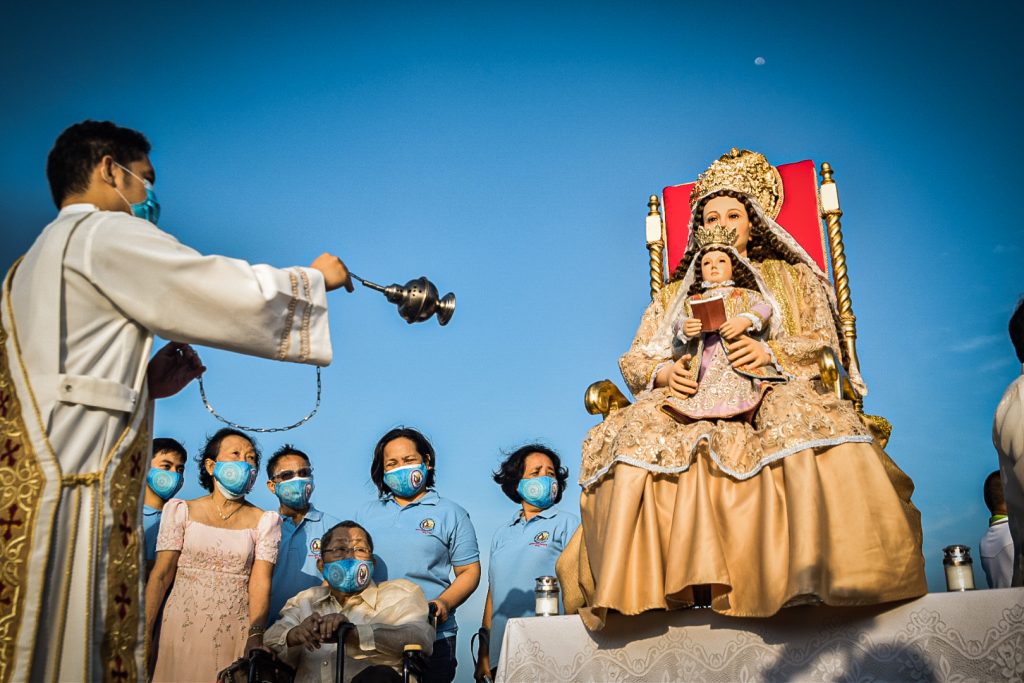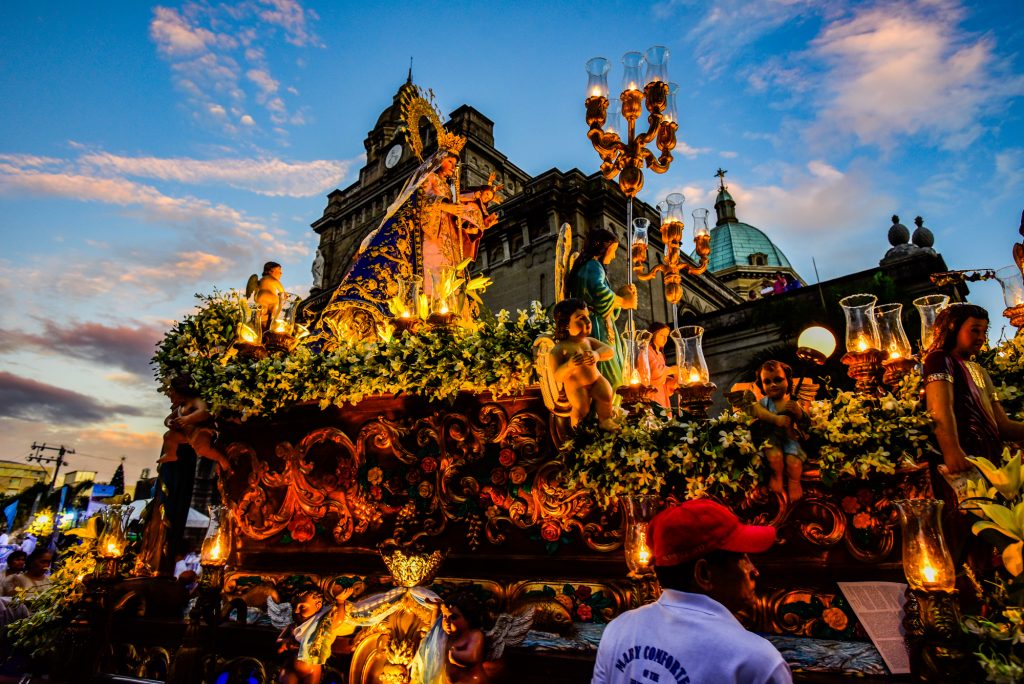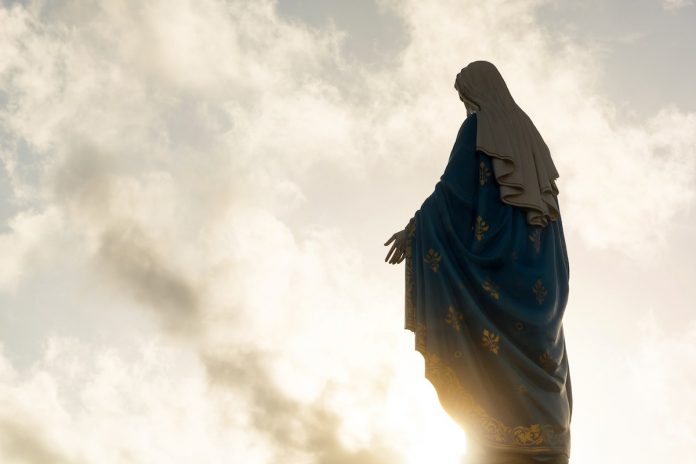Today we celebrate Mary taken up to heaven body and soul. It is one of the Marian dogmas of the Church and one of its infallible teachings.
No one knows what Mary looked like. European artists have made her look European. African artists have made her look African. Native American artists have drawn her in their image, as have artists from South America, the Far East and nearly every other part of the world as well. Myanmar too tries to draw Mary as a Burmese girl. In a sense, she has become the universal woman, adapted in every generation to every race and culture. One thing, however, artists everywhere have agreed upon: they have all depicted her as pious, thoughtful and serene.
“She,” of course, is Mary, the mother of Jesus. When Elizabeth, pregnant with John the Baptist, first saw her, she exclaimed, “Blessed are you among women,” and so it has been ever since. After Jesus Himself, no one has been more venerated, more honored or revered than this young girl from first century Israel. “Hail Mary, full of grace, the Lord is with thee…” Hail the Blessed Virgin, the New Eve, Holy Mary, Mother of Mercy, Mother of God. Except, it is pity that some of the communities try to ignore. A family without a mother is to be pitied. So also a denomination without a mother will scatter more.
What was she like? What kind of woman would be chosen by God to bear His Son, and what kind of woman would have the faith and grace to do it?
There are the usual qualities we traditionally think of. For example, we think of Mary as someone who was willing to take risks. She risked rejection by Joseph and even stoning by the other men in her village for being pregnant before she was married. She risked her own health and even her life by traveling to Bethlehem so close to term, and then giving birth unattended in a rude stable. She risked her life again by fleeing with Joseph to Egypt when a brutal dictator named Herod was seeking to kill her son.
Along with her courage, we traditionally think of Mary’s humility, holding it up as a model of faithfulness in an age when humility is radically out of fashion. “Here am I, the servant of the Lord,” she said; “let it be with me according to Your word.” Here God was proposing not only an “unplanned pregnancy” but a dangerous one at that, and Mary did not refuse. She did not insist on her moral autonomy, her right to self-fulfillment or her freedom to control her body or her life. Instead, she yielded both to God, that she might be an instrument of His will.
“Let it be with me according to Your word.” Mary allowed herself to be used and permitted her life to be changed forever in service to a higher good. Today that kind of self-subordination is condemned in many circles by women and men alike, who consider it “old-fashioned,” “repressive” or “unliberated.” It may be all of that and more in the eyes of the world, but Mary’s spirit of self-giving obedience and humility surely remains beautiful in the eyes of God who wishes to see more of it in both men and women today.
Even as Luke first introduces us to Mary, as she encounters the angel Gabriel, we see that while Mary is faithful and obedient, she still has a mind of her own. Gabriel greets her by calling her “favored one,” and immediately, the text says Mary is “perplexed.” She “ponders what sort of greeting this might be” (1:28-29).
Perhaps she senses that to be favored by God is to have your life turned upside down. Perhaps she recalls her Old Testament scriptures, which amply demonstrate that people pay a price in this world for acting as servants of God. At any rate, we know that even before she was told about Jesus, Mary was wondering whether this calling from God was something she wanted to get involved with.

Then, when Gabriel tells her she will conceive a son, we see the practical and skeptical side of Mary. “How can this be,” she asks, “since I am a virgin?” (Luke 1:34). At this point, she is thinking not of heavenly possibilities but biological realities.
Mary is also becoming part of a long tradition of people who argue and debate with God before accepting His will for their lives. Moses said he was unfit when God called him as leader of the Israelites (Exodus 4:1ff). Jeremiah claimed he was too young when God called him to be a prophet (Jeremiah 1:6). Jonah headed off in the opposite direction when God gave him a mission in Nineveh (Jonah 1:3ff). As so many biblical people had done before her, Mary demonstrates that God does not call self-effacing doormats into His service. He summons real people with real questions, objections, doubts and fears. It was only human for Mary to have them, as it is only human that we have them, too.
Our text shows Mary joining another tradition as well, a long line of women in the Bible — foremothers of our faith — who were chosen by God for special duties. Some, like Deborah or Jael, were judges or military leaders. But within this tradition is a smaller group of women whom God chose to bring special children into the world. They include Sarah, the aged wife of Abraham, who became the “Mother of Nations” by bearing Isaac, (Genesis 8:12) and Rachel, the mother of Joseph (Genesis 30:22). We have already mentioned Elizabeth, mother of John the Baptist. And then there was Mary.
These women were chosen for motherhood, but they were more than mere vessels for delivering children. They became interpreters of God’s will, reflecting on their own experience of pregnancy and motherhood to understand how God works in the world.
This is precisely what we see in our Old Testament lesson, where we meet a woman named Hannah, who lived a thousand years before Mary was born. Now, Hannah had been barren all her life, despite years of praying and pleading for a child. She daily felt the shame of her childlessness from other women in a culture where fertility was considered a sign of God’s favor.
Finally, God gave a very special child to Hannah; his name was Samuel and he became the last of Israel’s great judges. Of course, Hannah was ecstatic, and our text shows her expressing her joy in words of praise: “My heart exults in the Lord,” she says, “my strength is exalted in my God.”
A thousand years later, Mary echoed Hannah’s words as she interpreted her own situation in light of the methods, the mind and the will of God. By favoring a poor, obscure girl like her, Mary says, God has “scattered the proud in the imagination of their hearts.” By passing over other women who possessed more wealth, prestige or comfort and choosing Mary instead, God has “brought down the mighty from their thrones and lifted up the lowly.” By placing Himself among the poor and homeless, God has “filled the hungry with good things and sent the rich empty away.”
Here is Mary — thoughtful, serene, obedient Mary — giving us the good news of Christ’s birth in all its radical fullness! Here is Mary making sense of why God chose her among all women and explaining to the rest of us that when God’s will is enacted in the world, He radically inverts our worldly values. When God’s will is enacted in the world, the last become first and the first become last; the dishonored are exalted and the honored are humbled.
As we live by the ways of the world, honoring the rich and fawning over the famous, God comes to Bethlehem to honor the poor and bless the obscure. As we honor those with power and might, God comes to a stable to honor the powerless and the meek of the earth. As we honor all that is flashy and spectacular, God shows that His way is as humble as a manger and simple as a solitary star.
Did not the ancient prophet say, “For My thoughts are not your thoughts, neither are your ways My ways, says the Lord” (Isaiah 55:8)? This is also the message of Mary’s Magnificat, arising from her own reflection on her womanly experience as well as her knowledge of Old Testament scripture.
She declares as much in our text. “God has looked with favor upon the lowliness of His servant,” she says. She is a simple peasant girl, engaged to a carpenter and living in a dusty little village in a dusty little nation. She never calls herself anything unique or special, never claims to be more educated, refined or worthy in any way than anyone else. In fact, Mary realizes that the glory which has come to her is all God’s doing: “The Mighty One has done great things for me,” she confesses. She will be blessed among women for all eternity because she was an ordinary, unspectacular girl who said “yes” to a spectacular calling from God.

There is an important spiritual lesson to be learned here, which is that God doesn’t need people who are unusually strong or bright or well-to-do to be His servants. God doesn’t need people who are exceptionally well-educated or skilled to do His will – ordinary folks will do just fine. In fact, if you think about it for a moment, ordinary people are all God has to work with, so there is no reason for any of us to say no to His summons to service!
Like Mary and countless other servants before her and since, we think of all the reasons God can’t be calling us to ministry in His name. We aren’t good or deserving enough. We aren’t faithful or religious enough. We don’t have this, that or the other thing which would commend us to God or qualify us for His service.
The problem with this is that we assume too much of ourselves and too little of God when we think in those terms. We assume that God’s work is always so monumental and earthshaking that we need special gifts or talents to be useful to Him, when the truth is that God doesn’t need any of that from us! God doesn’t need the strength of our flesh but the willingness of our spirit. God is so great and His power so glorious that all He needs is for average, everyday people like you and me to submit our wills to His.
Mary, like Jesus Himself, was born sinlessly and taken soul and body up to heaven after she died.
Years ago, Harry Emerson was invited to give an address at the American University of Beirut, Lebanon, where the student body comprised citizens of many countries and representatives from sixteen different religions. What could one say that would be relevant or of interest to so mixed and varied a group? This is how Harry began: “I do not ask anyone here to change his religion; but I do ask all of you to face up to this question: What is your religion doing to your character?” What does your devotions and especially devotion to Our Lady do to your character?
Do we really careful in imitating her virtues?
There are two birds that fly over our especially in deserts: One is the hummingbird and the other is the vulture. The vultures find the rotting meat of the desert, because that is what they look for. They thrive on that diet. But hummingbirds ignore the smelly flesh of dead animals. Instead, they look for the colorful blossoms of desert plants. The vultures live on what was. They live on the past. They fill themselves with what is dead and gone. But hummingbirds live on what is. They seek new life. They fill themselves with freshness and life. Each bird finds what it is looking for. We all do.
In life, there are two birds. The one bird looks for foolishness and stupidity, the other looks for wisdom. The vultures seek to fill themselves with the rotting flesh of drunkenness and debauchery, the hummingbird sobriety, freshness, and the Spirit. In the desert of this world you have your scavengers who are angry and ungrateful, but you also have those who hum a grateful hymn of thanksgiving. The irony is that you find what you are looking for.
We honor Mary, she is like the hummingbird, always praising and thanking God and others in spite of hard times and trying circumstances?
Are we like Mary or the one who is always angry, ungrateful and revengeful?
Mary Assumed into Heaven: Pray for us.









